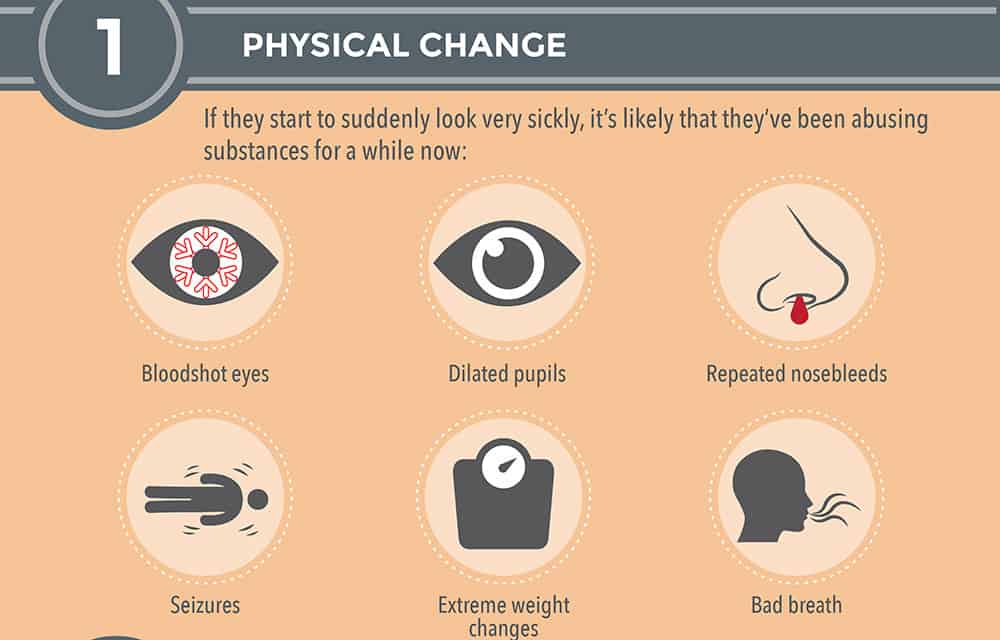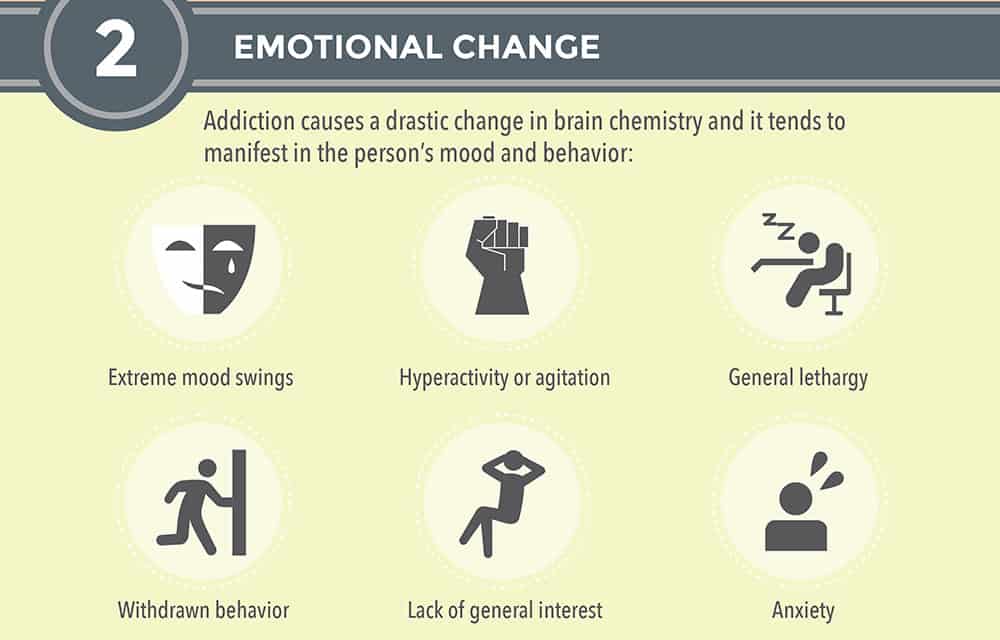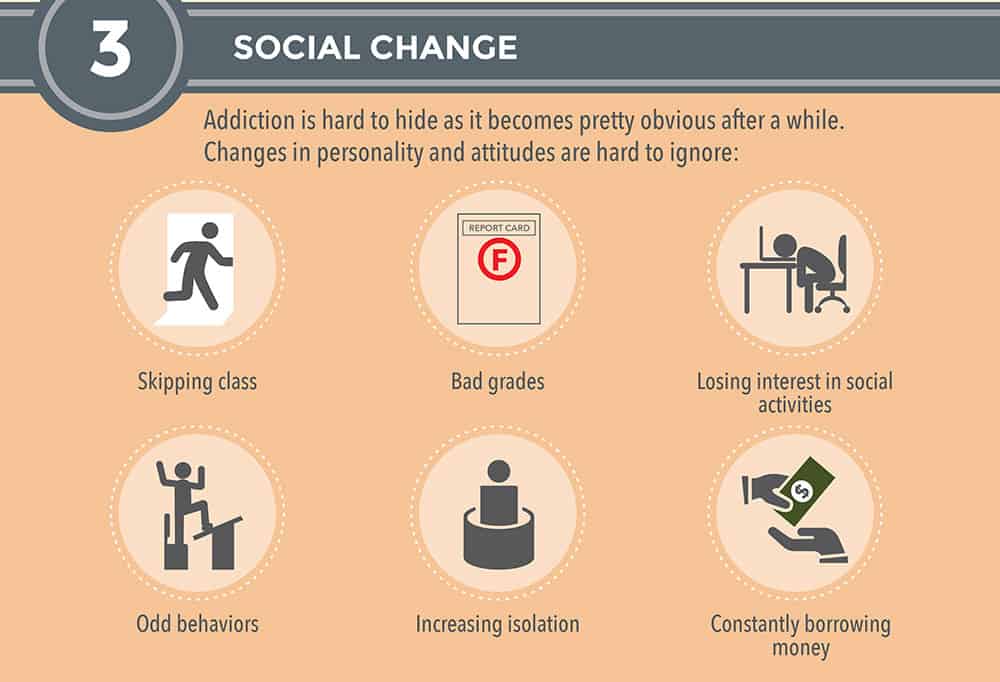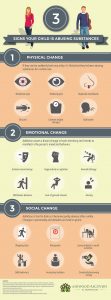“It’s not the addict I hope will be grateful for my love. It’s my child. My child is the one who needs to see my strength. My devotion. My resolve. My child needs me to face down what has become his worst enemy. Not help it. My child is the one I want to see life beyond tomorrow.”
~ Sandy Swenson
It can be difficult to know whether your son or daughter is abusing drugs or alcohol – particularly when college and work take them out of your daily life. If you are concerned that your child may be suffering from addiction or alcoholism, consider the three major indicators discussed here as warning signs – and learn what you can do about it. There are dozens of indicators when an individual is abusing either drugs or alcohol (or both). From heavy circles under the eyes due to a lack of sleep to become socially withdrawn or secretive, nearly everyone who becomes addicted to drugs or alcohol gives off several signs of addiction. However, all these signs can be boiled down to three major areas: physical changes, emotional changes, and social changes. Each of these areas is looked at in more detail below, along with the specific signs that your son or daughter is abusing drugs or alcohol.
“Get the help you need today. We offer outpatient assistance, so you can maintain your work, family, and life commitments while getting the help you deserve!”
How Drugs Impact the Brain and Body
To understand what’s happening with your child when they abuse drugs, it’s important to recognize the impact that drugs have on the brain and the different systems of the body. When you’re armed with this information, you can more easily identify the signs that your child is abusing or addicted to a substance. Addictive drugs work by attaching to the cells in your brain. Depending on the substance being abused, they may work differently but all have an effect on the brain. The substance will attach to the brain cells and create a reaction in the system. The person may feel more energetic or relaxed based on what they took. How fast and how severe the reaction will also depend on how the substance was used. Snorting or injecting usually causes a more intense reaction in a shorter time than taking the substance orally or smoking it. Once the brain gets used to the substance, it begins to see its presence in the system as normal. When the person stops using for a period of time, the brain goes into panic mode. It sends triggers to the system to warn it that things aren’t “normal.” This causes withdrawal, which leads the person to get more of the substance. Withdrawal symptoms can be so severe that the person must get the drug or alcohol even if they want to stop using. When a person starts using an addictive drug, they may abuse it but not be addicted. They like the way it makes them feel so they keep using, but they don’t suffer withdrawal symptoms. However, addiction will generally occur in time if they continue to use.
Why Teens and Young Adults Start Using Drugs
It’s also important to understand what can drive your son or daughter to use addictive drugs or alcohol. Many parents say their kid is a “good kid” and they didn’t think they would get involved with drugs. What they fail to realize is no one intends to become addicted when they start using, and it doesn’t mean they are a bad person if they do. Peer pressure is often the reason people start abusing drugs. They may be offered a drug at a party or with a group of friends. They want to appear cool so they try it. They think just one time won’t hurt. In other situations, the person may start abusing drugs to help them with a situation. They may be nervous in crowds or feel anxious. They may need help staying awake to study. The positive effects of these drugs appeal to the user in the beginning. They like the energy it gives them and the self-confidence. They may like the way it relaxes them when they’re feeling stressed out about school or other issues. When it comes to alcohol, drinking is a socially acceptable activity for many college students. They drink when they hang out with friends, playing drinking games or just trying to outdo each other. Some people are more susceptible to becoming addicted to alcohol when they drink excessive amounts. However, no one expects the outcome that happens when addiction to any substance occurs.
Sign #1: A Physical Change in Your Child
One of the major indicators of both drug addiction and alcoholism is a physical change in the person who is struggling. Dependency on drugs and alcohol is all but certain to change a person’s physical appearance – that is, a less healthy look in their face and body, and a deterioration in personal hygiene. According to the National Council on Alcoholism and Drug Dependence, some of the major physical and health signs of substance abuse include:
- Eyes that are bloodshot or pupils that are smaller or larger than normal
- Frequent nosebleeds (a sign of meth or cocaine use)
- Altered appetite and sleep patterns – also extreme weight loss or gain
- Seizures (with no prior history of epilepsy)
- Deterioration in physical appearance and personal grooming
- Impaired coordination, with injuries or bruises of unknown origin
- Unusually bad breath or body odor
- Tremors, shakes, incoherent speech, and impaired coordination
Of course, some signs of substance abuse and addiction vary depending on the type of substance being used. Encountering alcohol on the breath or hangover symptoms on a daily basis signifies alcohol dependency. Inhalants usually result in red eyes, chemical breath, or stains on the face. Stimulant addiction is associated with nosebleeds or a constant runny nose, along with a lack of sleep. Addiction to heroin is usually associated with very small pupils, as described above, and a drowsy appearance. “Parents tend to underestimate the risks or seriousness of drug use. The symptoms [of addiction] suggest a problem that may already have become serious and should be evaluated to determine the underlying cause – which could be a substance abuse problem or another mental health or medical disorder. Parents who are unsure whether their child is abusing drugs can enlist the help of a primary care physician or drug abuse treatment provider.” ~ National Institute on Drug Abuse Though the physical indicators outlined above are not the only signs your son or daughter is abusing drugs or alcohol, they are often the most readily apparent. If you encounter several of these symptoms over a short period of time, it may be time to ask your child about their drug or alcohol use. Just asking the question can be the first step towards getting them the professional help that they need.
“We treat both addiction and co-occurring disorders and accept many health insurance plans. Take a look at our outpatient program today!”
Identifying Specific Drugs Based on Appearance
Sometimes you can tell which drug your child is taking simply by how it makes them look. This is important because it helps you be better able to get them the treatment they need if you know the drug that is behind the issue. For example, people who abuse heroin often get what is known as the “heroin look.” You’ve probably seen it on TV with models and actors who appear emaciated and have brittle hair and nails. They seem drugged and lethargic. In fact, some young adults start using heroin to help them lose weight. The person who is abusing heroin may fall asleep at odd times and seem confused or dazed. Their speech is often slurred and they have trouble formulating thoughts. Meth is another drug which presents a unique appearance. One of the best-known and most common signs of meth addiction, especially for those with long-term abuse problems, is the loss of teeth. The meth damages the tooth at the roots and causes it tall out. The person also loses weight and their skin takes on a dull appearance. Changes in a person’s look can happen in just a few weeks or months if they’re using meth. Someone who is a long-term alcoholic will look much older than their age. They may have an ashen or jaundiced skin tone. The person often develops red, blotchy patches of skin and bloodshot eyes. They may be shaky and sweat heavily. Men who are alcoholics may lose their body hair and develop more feminine traits.
Long-term Physical Indications and Health Problems of Addiction
The impact of addiction becomes more severe and pronounced the longer the person is using. They often develop health conditions which don’t go away even if they receive treatment and become sober. For instance, liver damage is a common result of alcoholism. It is manifested in the appearance through jaundiced coloring. Many drugs cause the nails to weaken and the hair to become brittle. Even after the person stops using, the drugs can stay in the system for months, preventing them from looking healthy even though they are in recovery. Studies show that some drugs kill brain cells, which means the person can never completely recover from drug abuse. Damage to the heart, lungs, liver, kidneys and other organs may be irreversible. The person may be more susceptible to colds and flu and develop other complications because of weak organs. This is one reason it’s important to try to get your child to receive help as soon as possible. It’s also critical that you be able to identify drug abuse in its earliest stages, when treatment is more likely to be successful and less permanent damage has been done.
Sign #2: An Emotional Change in Your Child
In addition to the physical effects, drug and alcohol dependency often cause a large shift in the emotions and psychology of the addict or alcoholic. In some extreme cases parents are unable to even recognize their child as the same person, due to their mood swings and changes in personality. The National Council on Alcoholism and Drug Dependence highlights some of the main psychological warning signs of alcohol or drug abuse:
- Unexplained and confusing change in personality and attitude
- Sudden, extreme mood swings, such as irritability, angry outbursts, or even laughing at nothing
- Sustained periods of hyperactivity or agitation
- A marked lack of motivation and an inability to focus
- General lethargy to daily tasks
- Withdrawn behavior
- Anxiety or paranoia with no apparent cause
- Repeated dishonesty
- A loss of interest in the family
The symptoms outlined above make it clear that substance abuse and addiction result in neurological and emotional effects as much as physical ones. “I understand addiction now. I never did before, you know. How could a man (or a woman) do something so self-destructive, knowing that they’re hurting not only themselves, but the people they love? It seemed that it would be so incredibly easy for them to just not take that next drink. Just stop. It’s so simple, really. But as so often happens with me, my arrogance kept me from seeing the truth of the matter.” ~ Marie Sexton If you see any of these emotional and personality changes in your child, particularly in conjunction with the physical symptoms already discussed, it is likely because your son or daughter is abusing drugs or alcohol. Both depression and aggression are signs of addiction, and one of the best ways to deal with this emotional fallout is to address the underlying issue: addiction itself. Just as addiction is out of their control, much of this emotional backlash is as well.
Emotional Changes Based on Specific Drugs
Emotional changes vary based on the type of drub being abused. For instance, an alcoholic often experiences depression when they drink. Someone on meth is likely to be energetic and quite talkative, which is more noticeable if the person is normally quiet. Drugs which are stimulants like meth and cocaine will make a person more outgoing and high-energy. Drugs which relax the body will make the user quiet and often lethargic. Emotional signs of withdrawal are also different. One of the worst is with meth. When a person is coming down from meth or trying to stop using it, they will experience hallucinations in the form of bugs crawling on them. You may notice the person trying to pick imaginary bugs off their skin. They will often get hysterical because they can’t get the feeling to stop. When someone is suffering from withdrawal for alcohol, they become jittery and irritable. They may be angry and irrational. They are more likely to be physically abusive to someone at this time. Heroin users often suffer from hallucinations and paranoia. They see things that don’t exist, which cause them to go into a panic. As you learn what to expect when a person is in withdrawal or high, you’ll be able to identify the drug or at least the type of drug they are abusing. It can help you figure out how to reach out to them and convince them to get help.
Damage to the Brain from Drug Abuse
Some addictive drugs are so powerful, the user exhibits long-term effects even after they begin recovery. It can take months for them to feel normal. In some cases, the damage to the brain may be permanent. Studies show that certain drugs destroy brain cells. Once these cells are destroyed, they can’t come back. A person may have trouble with memory loss or being able to hold a conversation because they can’t remember what they were going to say. They may be slower to process thoughts or even be confused. It can be challenging for recovering addicts to find a job if they have significant brain damage from the drugs. In some cases, the person will continue to improve over months. With other situations, they will reach a point where no more recovery is possible and their limitations are permanent. It’s important to get your child to accept help as soon as they can to prevent long-term brain damage. This is one reason you should be able to identify when your child is abusing drugs.
Sign #3: A Social Change in Your Child
While addicts tend to be secretive about their drug or alcohol abuse, addiction is difficult to hide completely. If your son or daughter is abusing drugs or alcohol, you will likely see a change in their behavior along with the physical and emotional changes described above. Some of the behavioral signs of alcohol or drug abuse, as outlined by the National Council on Alcoholism and Drug Dependence, include:
- Skipping class, lower grades, or getting in trouble at school
- A marked loss of interest in social activities, hobbies, exercise, or sports
- Decreased motivation to go out
- Complaints of unusual behavior from friends, classmates, and co-workers
- Clashes with family values and beliefs
- A sudden change in friendships, relationships, and chosen hobbies
- Isolated, withdrawn, or sullen behavior
- Secretive and suspicious behavior around friends and family
- Sudden requests for money from family members (or even stealing)
- Obsession with drug or alcohol paraphernalia
- Drinking increasing amounts of alcohol in a social setting
Long-term Behavioral Issues from Drug Abuse
When a person stops using and gets help in a drug treatment center, most of these behaviors will stop. However, it doesn’t mean they won’t experience any long-term effects from their addiction. During their drug use, they may damage or destroy relationships to the point that they no longer have contact with the person. They may lose their jobs because they couldn’t show up or they stole from the employer. Many addicts physically and emotionally abuse their family members when they are high or seeking a high. Even if the family member is still with them, they bare the scars of the relationship. Often, the person takes what they can of the abuse and then leaves when they see no hope in sight. Your son or daughter may have lost a boyfriend or girlfriend or a spouse because of their addiction. They may not have contact with a child due to their behaviors. Even though they can get the help they need to overcome their addiction, it won’t automatically fix the damaged relationships. They will have to live with the consequences of their actions. While this may seem discouraging, it’s important to know family therapy is available. It can help rebuild those relationships over time. They won’t be the same as they were before the addiction, but it can give them a new start. Addiction hits the hardest when it begins to affect relationships, as it is sure to if the drug or alcohol abuse goes unchecked. If you see these signs and find that your son or daughter is abusing drugs or alcohol, do not take it personally. They will need all the social support and love that they can get. But now that you have identified the problem, what can you do about? Perhaps more importantly, what can’t you do about it? We are here to help answer those questions.
“We accept many health insurance plans. You can get your life back in order with our outpatient program today!”
Mental Health Disorder and Drug Addiction
Drug addiction often hides another problem: a mental health disorder. When these two conditions go together, it’s known as a dual diagnosis. Identifying such a situation is often difficult because the person has become adept at hiding their mental disorder and can now hide their addiction. In fact, they may be using the addiction to mask the symptoms of the mental health disorder. Co-existing conditions can change the signs of addiction. At first, it may appear that the person is feeling and acting better. They seem more in control. For example, a person with social anxiety may use alcohol to cover up their insecurities of being in a crowd. Instead of being a wallflower or avoiding social situations, they may go out more and appear to have a good time. It seems all is well, and your child is developing self-confidence. It’s only when the addiction gets stronger and they begin to suffer withdrawal symptoms does another side come out. They may once again become anxious and fearful until they can get the next drink. Many times, no mental health disorder has been diagnosed so you may not be aware it exists. The son or daughter realized something was wrong with them, but they didn’t want anyone to know. Instead of seeking help because they were embarrassed, they self-medicated with a substance. Even though the substance seems to help the person in the beginning, soon it will make the symptoms of the mental health condition worse. The person may suffer the same symptoms when they can’t get a fix or drink only they become even worse than before. If a parent suspects their son or daughter of a dual diagnosis, they need to get help where both conditions will be treated. Treating one without the other is a recipe for a relapse.
What to Do if Your Child is Abusing Drugs or Alcohol
If you are not sure whether your child is actually addicted to drugs or alcohol, given the signs discussed above, you can take this quiz to help determine if your family member is suffering from addiction. Be sure to understand both the nature of addiction and the major physical, emotional, and social effects it can have on your child before you take a next step. Part of this is accepting that addiction is a mental disorder, and it is neither your fault nor your child’s fault. That said, we believe that the recovery process involves the entire family support system and can help both you and your child receive the needed care. “It takes a lot of courage to seek help for a child with a possible drug problem because there is a lot of hard work ahead for both of you, and it interrupts academic, personal, and possibly athletic milestones. However, treatment works, although it may take time and patience.” ~ National Institute on Drug Abuse If you suspect that your college-aged or young adult child may be addicted to drugs or be suffering from alcoholism, one of the best things you can do is to let them know that you care and that you are there for them. Before doing so, take some time to learn about the difference between helping and enabling. Understanding the difference is not always something that comes naturally to people and taking time to learn about an appropriate response to addiction and alcoholism will make any steps you take much healthier for both yourself and your child.
What is Enabling?
Most parents desire to help their child overcome drug abuse and addiction. They don’t want to add to the problem, but they may do so unknowingly. There is a difference between helping an addict and enabling them. When a parent enables their child, they are making it easier for them to continue with their current behavior. A prime example of this situation is when the child loses their home because they can’t pay the rent without a job. They lost the job because they couldn’t show up when they were high. The parent who is trying to help their child offers to let them stay in their home until they can “get their act together.” Instead of getting better, the person now has more motivation to continue using drugs since they don’t have any responsibilities. Perhaps instead of losing their apartment, they went to their parents for money to pay the rent. They took the money for rent and spent it on more drugs. Parents generally don’t realize they are enabling their children in their addiction, but that is the end result. The opposite of enabling is often tough love, which can be the most difficult thing for a parent to do.
The Need for Intervention
Getting a child to see the need for help and then taking the next step can be almost impossible. Sometimes, an intervention may be part of the tough love that a parent must give. An intervention is a time when family and friends sit down with the addict and attempt to get them to see their need for drug treatment. A professional interventionist may be part of the meeting and even talk to the participants ahead of time to help them know what to say and how to say it. The reason an intervention works is because the addict is hearing the same message from multiple people all at once. It can often get through when a parent’s words fall on deaf ears. Of course, the addict may become defensive and angry, but many times, they will begin to listen and admit they have a problem. When an intervention works, the person can be admitted into a drug rehab program right away.
Getting Help for Drug Addiction with Rehab
When a child has finally admitted they have a problem with drugs or alcohol, they may not know where to turn even though they know they need help. Parents can help with this next step by researching drug rehab centers ahead of time. They can find out what’s available and help the addict determine if inpatient or outpatient treatment is right for them. The parent can take the addicted child to the facility for a tour. Sometimes, this helps them feel more comfortable about seeking help if they find a clean facility and friendly staff. The fear of the unknown is one reason addicts fail to seek out treatment. As parents do their research about the different options for treatment, they can provide this information to their addicted child and help them make the decision on where to go. At the same time, it’s important that they take responsibility for their own recovery because they’ll be more inclined to stick with the program. During the tour, it’s possible to ask questions about the facility. The parent and child should get answers to any concerns they have about treatment. This gives them more confidence in the success of the plan and allays those fears which may have prevented them from seeking treatment earlier.
Seeking Help at Ashwood Recovery at Northpoint
Ashwood Recovery at Northpoint in the Boise/Meridian area offers outpatient treatment for addicts. We know that no single solution is right for everyone, but we provide one option for those who are seeking treatment. We treat adults and adolescents who suffer from drug addiction or co-occurring disorders. Patients receive an individualized plan for addiction treatment based on their unique needs. There are a variety of programs such as group therapy, motivational interviewing, trauma resolution and more. Families and addicts can ask about any of our programs to learn what they are all about and how they help the addict begin recovery. Outpatient treatment won’t work for everyone. When someone comes to Ashwood Recovery, we perform an in-depth assessment on them to determine if they need inpatient treatment or if outpatient rehab is a good fit. For those who need more services than what we provide, we offer a recommendation to one of the inpatient facilities in the area. For others, intensive outpatient treatment will be the right choice. It consists of three sessions of three hours with individual and family counseling. The program provides the support and tools the addict needs while allowing them to maintain their normal routines. Family counseling occurs twice a month on family night. This program helps addicts receive the support they need while mending broken relationships. If you have any further questions, please give us a call. Find out how Ashwood Recovery can help you son or daughter begin the process of recovery from drug or alcohol addiction.
What Did you Think About This Blog?
Give it a Rating!
[kkstarratings]





